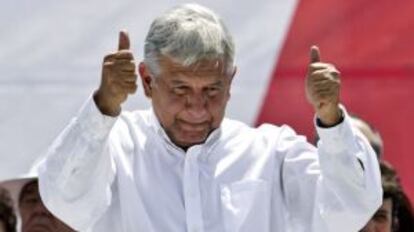Mexico’s Supreme Court quashes referendums on energy reform
Leftist forces, which oppose opening market to private capital, will keep fighting for cause


Mexico’s left has just lost its last battle in defense of oil, which it sees as a national asset that must remain in the hands of the state.
The Supreme Court on Thursday struck down leftist parties’ plans to hold two popular referendums on the energy reform promoted by President Enrique Peña Nieto, of the Institutional Revolutionary Party (PRI). The reform got congressional approval in July, ending a 76-year-old state monopoly over gas and crude.
The top court of justice ruled that the aim of both referendums, which would have questioned the government’s privatization of the energy sector, are unconstitutional because they affect the nation’s revenues and expenditures.
This opening of the market to private capital, which was backed by the conservative National Action Party (PAN), has become the leitmotiv of the Peña Nieto administration ever since the president took office nearly two years ago.
Since 2013, when the plans for reform were first introduced, the Mexican left has been waging a battle against it, led by the Democratic Revolution Party (the largest left-wing group in the country) and Morena, a party headed by former Mexico DF leader Andrés Manuel López Obrador.
After staging mass protests, running television ads and publishing spreads in all the nation’s main newspapers, the leftist coalition had been hoping to hold a plebiscite, an option included in Mexican legislation introduced in 2012.
But nine out of the 10 justices who sit on the Supreme Court said that such a popular vote cannot be held on topics that affect national security, the armed forces, restriction of human rights and public revenues, as per the 2012 laws.
Opponents of the energy reform say that they will not give up.

“We will continue to fight to defend the nation’s heritage,” said Carlos Navarrete, president of PRD, adding that they will take their case to the Inter-American Court of Human Rights.
Reform opponents meant to hold two referendums throughout 2015. The first question would be: “Do you agree or not with awarding contracts or concessions to national or foreign entities for the exploitation of oil, gas, refineries, and the petrochemical and electricity industries?” The second plebiscite would ask: “Do you agree with maintaining the reforms to articles 25, 27 and 28 of the Constitution on energy reform?”
Justice Margarita Luna justified her decision against the referendums with the argument that the second question in particular “is very difficult to answer, as it is broad, touches on many subjects and is therefore confusing.”
The only justice who defended the referendums was Jose Ramón Cossío Díaz, who said the right to a popular plebiscite is included within the Constitution.
Following the ruling, Andrés Manuel López Obrador said that “the Mexican nation has been denied the right to decide.” During a speech in the state of Morelos, he stated that “the Court is a political tool, not an agent for justice.”
Tu suscripción se está usando en otro dispositivo
¿Quieres añadir otro usuario a tu suscripción?
Si continúas leyendo en este dispositivo, no se podrá leer en el otro.
FlechaTu suscripción se está usando en otro dispositivo y solo puedes acceder a EL PAÍS desde un dispositivo a la vez.
Si quieres compartir tu cuenta, cambia tu suscripción a la modalidad Premium, así podrás añadir otro usuario. Cada uno accederá con su propia cuenta de email, lo que os permitirá personalizar vuestra experiencia en EL PAÍS.
¿Tienes una suscripción de empresa? Accede aquí para contratar más cuentas.
En el caso de no saber quién está usando tu cuenta, te recomendamos cambiar tu contraseña aquí.
Si decides continuar compartiendo tu cuenta, este mensaje se mostrará en tu dispositivo y en el de la otra persona que está usando tu cuenta de forma indefinida, afectando a tu experiencia de lectura. Puedes consultar aquí los términos y condiciones de la suscripción digital.








































